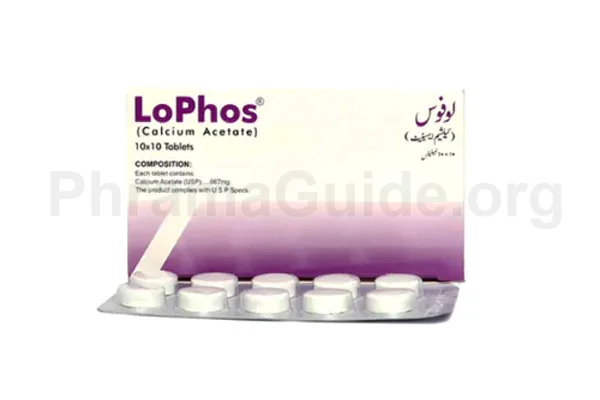Lophos is a medication commonly used to treat high phosphate levels in people with kidney disease. While it’s effective in managing phosphate levels. Lophos can have various side effects, some of which are more common than others. Some common and less common side effects of Lophos may include:
Common Side Effects
- Gastrointestinal Issues: Some people may experience a common side effect of Lophos stomach upset, including nausea, vomiting, or constipation.
- Hypercalcemia: This is an elevated level of calcium in the blood, which can lead to symptoms like confusion, weakness, frequent urination, and in severe cases, heart rhythm abnormalities.
- Calcium Deposits: Long-term use of Lophos may lead to calcium deposits in various tissues of the body, causing issues in organs like the kidneys, heart, or lungs.
- Allergic Reactions: In rare cases, allergic reactions to Lophos can occur, leading to symptoms like rash, itching, swelling, dizziness, or trouble breathing.
Less Common Side Effects
- Hyperphosphatemia: Paradoxically, in some cases, Lophos might not effectively lower phosphate levels and can lead to high levels of phosphate in the blood.
- Hypocalcemia: Although it’s meant to raise calcium levels, in some instances, Lophos can lead to low calcium levels, causing symptoms like muscle cramps, tingling sensations, or spasms.
- Calcium-Based Kidney Stones: Prolonged use of Lophos can potentially increase the risk of developing calcium-based kidney stones.
- Altered Mineral Balance: Apart from affecting calcium and phosphate levels, Lophos might also impact other mineral levels in the body, potentially leading to imbalances in magnesium or aluminum.
- Constipation or Diarrhea: While constipation is a common side effect, some individuals might experience diarrhea as a reaction to Lophos.

What is Lophos?
Lophos is one of the leading brands of Calcium Acetate, manufactured and marketed by RG Pharmaceutica (Pvt) Ltd, Pakistan.
Lophos : Available Formulations and Strengths
Presently, Lophos is available in Tablet Form with the following strengths.
Lophos Tablet : 169mg strength
What Are The Possible Drug Interactions of Lophos?
- Antibiotics (Quinolones and Tetracyclines): Lophos can interfere with the absorption of certain antibiotics like ciprofloxacin, levofloxacin, doxycycline, and tetracycline. It’s recommended to take these antibiotics a few hours before or after Lophos to avoid reduced antibiotic absorption.
- Thiazide Diuretics: Concomitant use of Lophos with thiazide diuretics like hydrochlorothiazide may lead to increased blood calcium levels, potentially resulting in hypercalcemia.
- Vitamin D Supplements: Taking Lophos along with vitamin D supplements may lead to increased calcium levels in the blood. While vitamin D is often prescribed to enhance calcium absorption, excessive intake of both can cause hypercalcemia.
- Medications Containing Aluminum: Combining Lophos with medications containing aluminum (like certain antacids) may increase the risk of aluminum toxicity.
- Corticosteroids: Concurrent use of corticosteroids with Lophos may further elevate calcium levels in the blood, potentially leading to hypercalcemia.
- Phosphate Binders: Combining multiple phosphate binders (like calcium-based and aluminum-based binders) without proper monitoring may lead to imbalances in mineral levels, especially calcium and aluminum.
- Iron Supplements: Lophos can interfere with the absorption of iron supplements. It’s advisable to separate the intake of Lophos and iron supplements by a few hours.

Leave A Comment